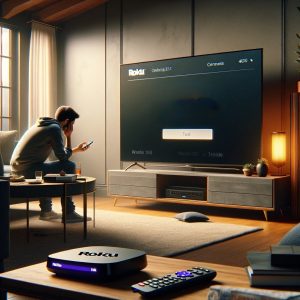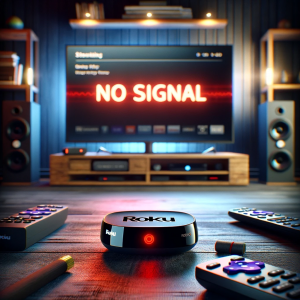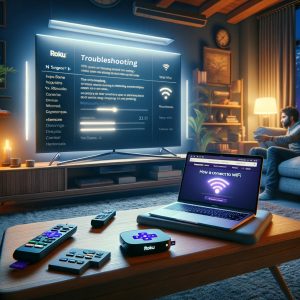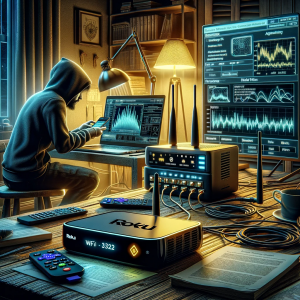Roku Not Connecting To Internet
In today’s digital age, Roku devices have become a staple in homes for streaming content seamlessly. However, a common hiccup that users often encounter is when their Roku is not connecting to WiFi or won’t connect to the internet. Your streaming experience may be interrupted by these connectivity problems, preventing you from watching your preferred series, films, and other content. Whether it’s a Roku tv won’t connect to wifi issue or a Roku streaming stick that won’t connect to the internet, understanding and resolving these issues is crucial for uninterrupted entertainment. This guide is designed to navigate you through the myriad of connectivity problems, offering detailed troubleshooting steps to get your Roku back online. We’ll explore everything from basic fixes to more advanced troubleshooting techniques, ensuring that whether your Roku won’t connect to WiFi or the internet, you’ll find a solution here.
Understanding Roku Connectivity Issues:
Roku devices can encounter connectivity issues for a range of reasons, affecting their ability to connect to WiFi and the internet. Identifying these issues is crucial for troubleshooting. Below are key points detailing common causes, symptoms, and error messages associated with Roku connectivity problems:
Common Causes of Roku Connectivity Issues:
-
Roku Weak Signal Strength Issues:
Roku devices may struggle to connect to WiFi if the signal strength is too weak, often due to the distance from the router or physical obstructions.
-
Incorrect Roku Network Settings:
Entering the wrong WiFi password or selecting the incorrect network can prevent Roku from connecting, leading to Roku not connecting to wifi issue.
-
Outdated Roku Software:
Failing to update your Roku device can lead to Roku wifi not working issues with newer network protocols, resulting in connectivity problems.

-
Router Issues:
Problems with your home network router, such as outdated firmware or incorrect configurations, can disrupt Roku’s internet connection causing Roku connectivity issues.
Symptoms of Roku Connectivity Problems:
-
Error Messages in Roku:
Roku displays specific error codes (e.g., “014.30,” “014.40,” “014.50”) to indicate WiFi or internet connection issues.
-
Prolonged Buffering or Loading:
Difficulty in streaming content smoothly, with extended buffering times, can signal Roku connectivity issues.
-
Inability to Launch Channels:
Roku might fail to open streaming channels due to a lack of internet connection.
-
Frequent Disconnections:
Experiencing repeated loss of connection while using Roku suggests potential WiFi stability problems.
Understanding Roku Error Messages:
-
Error Code “014.30”
suggests issues with connecting to the WiFi network, possibly due to wrong password entry.
-
Error Code “014.40”
indicates problems with obtaining an IP address from the router, pointing to DHCP issues.
-
Error Code “014.50”
highlights difficulties with internet connection, even though Roku is connected to the router.
Understanding these causes, symptoms, and error messages is pivotal in effectively troubleshooting and resolving Roku connectivity issues. Recognizing the specific signs of connectivity problems allows for targeted solutions.
Basis Troubleshooting Steps For Roku Wifi Not Working Issue:
When you find your Roku WiFi not working several basic troubleshooting steps can often resolve these common Roku connectivity issues. Follow these step-by-step solutions to help get your Roku device back online:
-
Verify Connection of Roku:
If your Roku does not connect to internet, make sure that your device is connected to the correct WiFi network. Navigate to Settings > Network > Check connection on your Roku device to verify the network status and strength.
-
Restart Your Router:
Sometimes, restarting your router can solve Roku connectivity issues. Unplug your router, wait for about 1 minute, & then plug it back in.
-
Soft Restart Roku:
On your Roku remote, press the Home button 5 times, the Up arrow once, the Rewind button twice, and the Fast Forward button twice. This sequence can help refresh the connection.
-
Power Cycle:
Unplug your Roku device from the power source, wait 1 minute, and plug it back in. This can resolve many Roku connectivity issues by clearing potential glitches.
-
Check for Roku Software Updates:
Roku devices automatically check for updates periodically, but manually checking can ensure you’re up to date. Go to Settings > System > System update > Check now to manually update your Roku.
-
Reposition Your Roku:
If your Roku does not connect to internet, move your device closer to your WiFi router to improve signal strength. Avoid placing the Roku behind the TV or inside a cabinet, as physical obstructions can weaken the signal causing Roku internet connection problems.
-
Reduce Wireless Interference of Roku:
Devices like cordless phones, microwave ovens, & Bluetooth devices can interfere with your WiFi signal causing Roku connectivity issues. Try to minimize interference by repositioning these devices or your router.
-
Reset Roku Network Connection:
If the above steps don’t resolve the issue, try resetting your Roku’s network connection. Go to Settings > System > Advanced system settings > Network connection reset.
These fundamental troubleshooting techniques can usually be used to fix the majority of Roku connectivity issues.
Device-Specific Connectivity Solutions For Roku Not Connecting To Wifi:
Different Roku models, including Roku TVs and Roku Sticks, may require tailored troubleshooting to address WiFi connectivity issues effectively. If your Roku TV won’t connect to WiFi here are device-specific solutions to enhance connectivity.
-
Direct Connection Attempt:
If your Roku is not connecting to wifi, ensure that the WiFi mode is set correctly. Some Roku TVs offer dual-band WiFi support. Try switching between the 2.4GHz and 5GHz networks if your router supports both, as this can sometimes resolve Roku connectivity issues.
-
System Restart:
Perform a system restart specifically for Roku TV by navigating to Settings > System > Power (if applicable) > System restart. This can help clear any temporary Roku connectivity issues that a standard restart might not solve.
-
Network Settings Adjustment:
Check the network settings on your Roku TV. Go to Settings > Network > Set up connection and re-enter your WiFi details.
-
Factory Reset (Last Resort):
If other steps fail, consider a factory reset as last resort.
By addressing the unique connectivity challenges such as when a Roku TV won’t connect to WiFi or a these tailored troubleshooting steps can help restore your access to seamless streaming.
Advanced Connectivity Troubleshooting For Roku Not Connecting To Wifi:
For users who have navigated through basic troubleshooting without success, encountering persistent messages like Roku unable to connect to wireless network advanced troubleshooting steps become necessary. These strategies delve deeper into network and device settings to resolve more complex Roku connectivity issues.
Changing DNS Settings on Your Router:
-
Access Router Settings:
Access your router’s settings by entering its IP address into a web browser. You might need to consult your router’s manual specific instructions and the default login credentials.
-
Modify DNS Settings:
Once logged in, look for the DNS settings. Changing the DNS server to a public DNS server like Google DNS (8.8.8.8 and 8.8.4.4) or OpenDNS (208.67.222.222 and 208.67.220.220) can improve connectivity and speed. Save your changes & restart both your router and Roku device to apply the new settings.
Adjusting Router Settings:
-
Update Router Firmware:
Make sure that your router’s firmware is up to date. Manufacturers often release updates to improve performance & resolve connectivity issues. Check manufacturer’s website for instructions on how to update your router’s firmware.
-
Adjust Wireless Channels:
Interference from other wireless networks can impact your Roku’s ability to connect. Changing wireless channel on your router to a less congested one can improve your WiFi signal strength and reliability. Channels 1, 6, & 11 are often recommended for 2.4GHz networks due to minimal overlap.
-
Enable Network Pinging:
Roku devices use network pinging to maintain their connection to your network. Some routers have security features that block anonymous pings, which can prevent Roku devices from staying connected. Ensure your router’s settings allow network pinging.
These advanced troubleshooting steps are designed for situations where your Roku does not connect to internet. By methodically working through these strategies, you can address more stubborn Roku connectivity issues that basic troubleshooting can’t resolve.
FAQs:
Q. Why is Roku not connecting to WiFi?
- A. If your Roku not connecting to Wifi, make sure that you’re entering the correct WiFi credentials, your Roku is within a good range of your router, & there are no physical obstructions or electronic interferences. Also, check for any available Roku system updates.
Q. What do I do if my Roku is connected to WiFi but not the internet?
- A. This issue often points to a problem with your internet service or router settings. Restart your modem & router to refresh your internet connection. If the problem persists, check your router’s settings to ensure there are no restrictions preventing your Roku from accessing the internet.
Q. How can I improve my Roku’s WiFi signal strength?
- A. Position your Roku closer to your WiFi router to minimize distance and obstructions like walls or furniture. Consider using a WiFi extender to boost the signal strength or an HDMI extender for Roku Streaming Sticks to reduce interference from the TV.
Q. Can changing the DNS settings on my router help with Roku connectivity issues?
- A. Yes, changing your router’s DNS settings to a public DNS server like Google DNS or OpenDNS can sometimes resolve connectivity issues. This change can help improve the speed and reliability of your internet connection, which may, in turn, improve your Roku’s ability to connect to WiFi.
Q. Why does my Roku unable to connect to wireless network?
- A. If your Roku is not connecting to wifi, make sure that your WiFi network is stable, consider assigning static IP address to your Roku device through your router settings, and reduce interference from other wireless devices.
Conclusion:
Throughout this comprehensive guide, we’ve explored a variety of scenarios, from Roku devices that are connected but not working to instances where the Roku signal strength is excellent, yet there’s no connection. The troubleshooting steps provided aim to address the wide range of connectivity and functionality issues that Roku users might encounter, ensuring that your streaming experience remains uninterrupted and enjoyable.
The guide underscores the critical importance of maintaining updated device software for optimal performance. Frequent software upgrades include solutions for known bugs and connectivity problems that may be affecting your Roku device in addition to introducing new features and enhancements.
We encourage Roku users to follow these troubleshooting steps carefully, using the detailed instructions and insights provided to address and resolve their Roku connectivity and functionality issues. Whether you’re facing a problem with your Roku remote, app performance, or connectivity challenges, these solutions are designed to restore your access to seamless streaming and enhance your Roku experience.
To know more about Roku TV and resolve its related issues, please visit Roku Support page.
